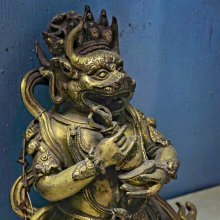Nrisimha, Nṛsiṃha, Nri-simha: 24 definitions
Introduction:
Nrisimha means something in Buddhism, Pali, Hinduism, Sanskrit, Jainism, Prakrit, Marathi. If you want to know the exact meaning, history, etymology or English translation of this term then check out the descriptions on this page. Add your comment or reference to a book if you want to contribute to this summary article.
Nrisimha has 22 English definitions available.
The Sanskrit term Nṛsiṃha can be transliterated into English as Nrsimha or Nrisimha, using the IAST transliteration scheme (?).
Images (photo gallery)
Languages of India and abroad
Sanskrit dictionary
[Deutsch Wörterbuch]
Source: Cologne Digital Sanskrit Dictionaries: Böhtlingk and Roth Grosses Petersburger WörterbuchNṛsiṃha (नृसिंह):—(1. nar + siṃha) m.
1) ein Löwe unter den Männern, ein grosser Held [Mahābhārata 9, 3031.] [Rāmāyaṇa 5, 53, 26.] —
2) halb Mensch halb Löwe, Viṣṇu in seinem 4ten Avatāra [Trikāṇḍaśeṣa 1, 1, 28.] [Mahābhārata 3, 15836.] [Harivaṃśa 2279.] [Bhāgavatapurāṇa 5, 18, 14. 7, 8, 20.] [ŚIVA-Pāṇini’s acht Bücher 1, 2] in [Oxforder Handschriften No. 113.] mantra [Tantrasāra ebend. 93,b,10.] mahiman [Weber’s Verzeichniss No. 826.] nṛsiṃhavapus = nṛsiṃha [Hemacandra’s Abhidhānacintāmaṇi 68], wo siṃhavapuravyayaḥ zu lesen ist. —
3) Nomen proprium verschiedener Männer [Colebrooke II, 359 u.s.w.] [Oxforder Handschriften No. 204. 355.] [Weber’s Verzeichniss No. 833. 864. 866. 874.] nṛsiṃhācārya [738.] caturdaśī der 14te Tag in der lichten Hälfte des Monats Vaiśākha (ein Festtag) [Asiatick Researches III, 280.] —
4) eine Art coitus [Ratimañjarī im Śabdakalpadruma]
--- OR ---
Nṛsiṃha (नृसिंह):—
1) [Bhāgavatapurāṇa 10, 70, 18.] —
2) dvādaśī Bez. des 12ten Tages in der lichten Hälfte des Phālguna [WILSON, Sel. Works 2, 221.] nṛsiṃha = nṛsiṃhabīja [WEBER, Rāmatāpanīya Upaniṣad 314. fg.] gāyatrī [Weber’s Indische Studien 9, 101. 104.] nṛsiṃhānuṣṭubh [148.] —
3) Nomen proprium eines Fürsten [Spr. 5000.]
Source: Cologne Digital Sanskrit Dictionaries: Sanskrit-Wörterbuch in kürzerer FassungNṛsiṃha (नृसिंह):—m. —
1) ein Löwe unter den Menschen. ein grosser Held. —
2) halb Mensch halb Löwe (Viṣṇu in seinem vierten Avatāra). Nom.abstr. tva n. [Indische studien von Weber 9,155.] —
3) ein Gebet an Viṣṇu in seiner Erscheinung als halb Mensch halb Löwe [Agnipurāṇa 43,18.] —
4) quidam coeundi modus. —
5) Nomen proprium verschiedener Männer [Indische sprüche 7646.] Auch siṃhācārya.
Sanskrit, also spelled संस्कृतम् (saṃskṛtam), is an ancient language of India commonly seen as the grandmother of the Indo-European language family (even English!). Closely allied with Prakrit and Pali, Sanskrit is more exhaustive in both grammar and terms and has the most extensive collection of literature in the world, greatly surpassing its sister-languages Greek and Latin.
See also (Relevant definitions)
Starts with (+84): Nrisimha acarya, Nrisimha bharati, Nrisimha bhatta, Nrisimha cakravartin, Nrisimha daivajna, Nrisimha deva, Nrisimha muni, Nrisimha pancanana, Nrisimha pancanana bhattacarya, Nrisimha sarasvati, Nrisimha shastrin, Nrisimha suri, Nrisimha thakkura, Nrisimha vajapeyin, Nrisimha yati, Nrisimha yatindra, Nrisimhabhairava, Nrisimhabhairavi, Nrisimhabharatyacarya, Nrisimhabhatta.
Ends with (+55): Abdhinrisimha, Abhayanrisimha, Adharanrisimha, Aghoraviranrisimha, Ahobalanrisimha, Akashanrisimha, Amritanrisimha, Anantanrisimha, Annadananrisimha, Aranrisimha, Atinrisimha, Atmanrisimha, Attahasanrisimha, Aveshanrisimha, Bhahkaranrisimha, Bhairavanrisimha, Bharati shri nrisimha, Bharatishrinrisimha, Bhaskaranrisimha, Bhutaprabhathinrisimha.
Full-text (+669): Nrisimhajayanti, Nrisimhaprakashika, Nrisimhiya, Nrisimhacarita, Nrisimhacampu, Nrisimhatapaniyopanishad, Nrisimhatapani, Nrisimhajayantikalpa, Nrihari, Nrisimhatva, Nrisimhaprasada, Nrisimhapanjara, Nrisimhapatala, Nrisimhamantra, Nrisimhamahiman, Nrisimhasarvasva, Nrisimhakarana, Nrisimhapaddhati, Nrisimhapurana, Nrisimhamahatmya.
Relevant text
Search found 76 books and stories containing Nrisimha, Nṛsiṃha, Nri-simha, Nrsimha, Nṛ-siṃha, Nr-simha, Nṛsimha, Nṛ-simha; (plurals include: Nrisimhas, Nṛsiṃhas, simhas, Nrsimhas, siṃhas, Nṛsimhas). You can also click to the full overview containing English textual excerpts. Below are direct links for the most relevant articles:
Garga Samhita (English) (by Danavir Goswami)
Verse 5.15.30 < [Chapter 15 - Seeing Sri Radha]
Verse 1.3.3 < [Chapter 3 - Description of the Lord’s Appearance]
Verse 1.13.16 < [Chapter 13 - The Liberation of Pūtanā]
Brihad Bhagavatamrita (commentary) (by Śrī Śrīmad Bhaktivedānta Nārāyana Gosvāmī Mahārāja)
Verse 2.1.63 < [Chapter 1 - Vairāgya (renunciation)]
Verse 1.5.8 < [Chapter 5 - Priya (the beloved devotees)]
Verse 2.4.155-157 < [Chapter 4 - Vaikuṇṭha (the spiritual world)]
Chandogya Upanishad (Madhva commentary) (by Srisa Chandra Vasu)
Second Adhyaya, Ninth Khanda (8 mantras)
Second Adhyaya, Tenth Khanda (5 mantras)
Dvisahasri of Tembesvami (Summary and Study) (by Upadhyay Mihirkumar Sudhirbhai)
Incorporation of Grammar in the Dvisāhasrī < [H. H. Ṭembesvāmī: Erudition]
Appendix 4 - Some Important words employed in the Dvisāhasrī
Chapter 13 - Staying at the confluence of rivers Bhīmā and Amarajā
Preceptors of Advaita (by T. M. P. Mahadevan)
Chaitanya Bhagavata (by Bhumipati Dāsa)
Verse 2.18.79 < [Chapter 18 - Mahāprabhu’s Dancing as a Gopī]
Verse 1.4.15 < [Chapter 4 - Name-giving Ceremony, Childhood Pastimes, and Thieves Kidnap the Lord]
Verse 1.2.171 < [Chapter 2 - The Lord’s Appearance]
Related products



